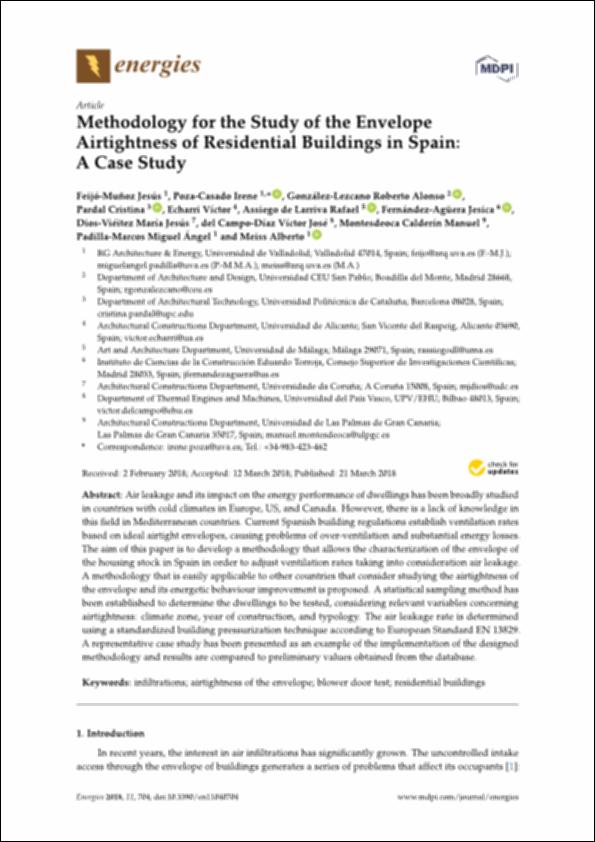Please use this identifier to cite or link to this item:
http://hdl.handle.net/10637/14601Methodology for the Study of the Envelope Airtightness of Residential Buildings in Spain
| Title: | Methodology for the Study of the Envelope Airtightness of Residential Buildings in Spain |
| Authors : | Feijó Muñoz, Jesús Poza-Casado, Irene González Lezcano, Roberto Alonso. Pardal March, Cristina Echarri, Víctor Assiego de Larriva, Rafael Fernández-Agüera, J. Dios-Viéitez, María Jesús Del Campo-Díaz, Víctor José Montesdeoca Calderín, Manuel Padilla Marcos, Miguel Ángel Meiss, Alberto |
| Keywords: | Residential buildings; Infiltrations |
| Publisher: | MDPI |
| Citation: | Feijó-Muñoz, J.; Poza-Casado, I.; González-Lezcano, R.A.; Pardal, C.; Echarri, V.; Assiego De Larriva, R.; Fernández-Agüera, J.; Dios-Viéitez, M.J.; Del Campo-Díaz, V.J.; Montesdeoca Calderín, M.; et al. Methodology for the Study of the Envelope Airtightness of Residential Buildings in Spain: A Case Study. Energies 2018, 11, 704. https://doi.org/10.3390/en11040704 |
| Abstract: | Air leakage and its impact on the energy performance of dwellings has been broadly studied in countries with cold climates in Europe, US, and Canada. However, there is a lack of knowledge in this field in Mediterranean countries. Current Spanish building regulations establish ventilation rates based on ideal airtight envelopes, causing problems of over-ventilation and substantial energy losses. The aim of this paper is to develop a methodology that allows the characterization of the envelope of the housing stock in Spain in order to adjust ventilation rates taking into consideration air leakage. A methodology that is easily applicable to other countries that consider studying the airtightness of the envelope and its energetic behaviour improvement is proposed. A statistical sampling method has been established to determine the dwellings to be tested, considering relevant variables concerning airtightness: climate zone, year of construction, and typology. The air leakage rate is determined using a standardized building pressurization technique according to European Standard EN 13829. A representative case study has been presented as an example of the implementation of the designed methodology and results are compared to preliminary values obtained from the database. |
| URI: | http://hdl.handle.net/10637/14601 |
| Rights : | http://creativecommons.org/licenses/by-nc-nd/4.0/deed.es OpenAccess |
| ISSN: | 1996-1073 |
| Issue Date: | 21-Mar-2018 |
| Center : | Universidad San Pablo-CEU |
| Appears in Collections: | Escuela de Politécnica Superior |
Items in DSpace are protected by copyright, with all rights reserved, unless otherwise indicated.


